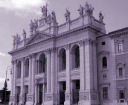Overcoming Temptation: 1st Sunday of Lent

The Readings for this Sunday are exceptionally rich, so we will have to limit ourselves to following just a few themes
1. The First Reading is the account of the Fall, in which Eve, followed by Adam, gives in to temptation by eating the fruit of the Tree of the Knowledge of Good and Evil.
Reading 1 Gn 2:7-9; 3:1-7
The LORD God formed man out of the clay of the ground
and blew into his nostrils the breath of life,
and so man became a living being.
Then the LORD God planted a garden in Eden, in the east,
and placed there the man whom he had formed.
Out of the ground the LORD God made various trees grow
that were delightful to look at and good for food,
with the tree of life in the middle of the garden
and the tree of the knowledge of good and evil.
Now the serpent was the most cunning of all the animals
that the LORD God had made.
The serpent asked the woman,
“Did God really tell you not to eat
from any of the trees in the garden?”
The woman answered the serpent:
“We may eat of the fruit of the trees in the garden;
it is only about the fruit of the tree
in the middle of the garden that God said,
‘You shall not eat it or even touch it, lest you die.’”
But the serpent said to the woman:
“You certainly will not die!
No, God knows well that the moment you eat of it
your eyes will be opened and you will be like gods
who know what is good and what is evil.”
The woman saw that the tree was good for food,
pleasing to the eyes, and desirable for gaining wisdom.
So she took some of its fruit and ate it;
and she also gave some to her husband, who was with her,
and he ate it.
Then the eyes of both of them were opened,
and they realized that they were naked;
so they sewed fig leaves together
and made loincloths for themselves.
The classic scriptural formulation of the nature of temptation is found in 1 John 2:15-16:
Do not love the world or the things in the world. If any one loves the world, love for the Father is not in him. For all that is in the world, the lust of the flesh and the lust of the eyes and the pride of life, is not of the Father but is of the world.
In the Christian tradition, this threefold love of the world—Lust of the Flesh, Lust of the Eyes, and Pride of Life—is known as the threefold concupiscence, and lines up roughly with the sins of (physical) lust, avarice (greed), and pride.
We see this threefold pattern at work when Eve gives in to temptation:
The woman saw that the tree was (1) good for food,
(2) pleasing to the eyes, and (3) desirable for gaining wisdom.
“Good for food”—this is physical lust. “Pleasing to the eye”—this is avarice, the desire to have more, to possess things for their beauty or value. “Desirable for gaining wisdom”—this is pride, because the purpose for gaining wisdom is to make herself equal to God. As the serpent says, “You will be like God” (RSV).
Although Eve is the one tempted into sin according to the narrative, the biblical and post-biblical tradition often attributes the Fall just as much, or even primarily, to Adam, probably because he was considered “head of the family,” and should have known better. Our liturgical translation rightly renders: "her husband who was with her," implying that Adam was passive and complicit in the whole event. Some other English translations leave out this important phrase. Adam was give the role of "working and guarding" in the Garden in Gen 2:15. Apparently he hasn't been "guarding" very well, because there is a snake in the Garden. Snakes are never a good thing. So the responsibility for Original Sin may be laid squarely at the feet of Adam, the original "deadbeat dad" who didn't take responsibility for protecting his nascent family.
2. The Responsorial Psalm is Psalm 51, the most famous psalm of penitence in the psalter, recited every Friday in the Liturgy of the Hours:
Responsorial Psalm Ps 51:3-4, 5-6, 12-13, 17
R/ (cf. 3a) Be merciful, O Lord, for we have sinned.
Have mercy on me, O God, in your goodness;
in the greatness of your compassion wipe out my offense.
Thoroughly wash me from my guilt
and of my sin cleanse me.
R/ Be merciful, O Lord, for we have sinned.
For I acknowledge my offense,
and my sin is before me always:
“Against you only have I sinned,
and done what is evil in your sight.”
R/ Be merciful, O Lord, for we have sinned.
A clean heart create for me, O God,
and a steadfast spirit renew within me.
Cast me not out from your presence,
and your Holy Spirit take not from me.
R/ Be merciful, O Lord, for we have sinned.
Give me back the joy of your salvation,
and a willing spirit sustain in me.
O Lord, open my lips,
and my mouth shall proclaim your praise.
R/ Be merciful, O Lord, for we have sinned.
By tradition, David wrote this psalm after his sin with Bathsheba. David was a New Adam figure in his own right. He was a royal priest (wearing an ephod in 2 Samuel 6:14; see also Psalm 110) and king of creation (see Psalm 89:19-37). Like Adam and Eve of old, he fell to the threefold concupiscence (see 2 Sam 11), first ogling the beautiful Bathsheba (Lust of the Eyes), then sleeping with her (Lust of the Flesh), then being too proud to admit wrongdoing, but instead committing murder to hide his sin (Pride). Like Adam (Hosea 6:7), David was the recipient of a divine covenant (see 2 Sam 7:4-17; Ps 89:28, etc.), who promptly broke his covenant relationship by sin. David represents an advance over Adam, however, inasmuch as David repents with great contrition (2 Sam 12:13-16, Psalm 51). David prayers for a “clean heart” and a “new spirit” within him, which is an anticipation of the cleansing of our hearts by the Holy Spirit through baptism in the New Covenant (Acts 2:37-38). The sacrament was not available to David but he longed for its reality.
3. In the Second Reading (Romans 5:12-19), St. Paul explicitly sets up a typological relationship between Adam and Christ:
Reading 2 Rom 5:12-19
Brothers and sisters:
Through one man sin entered the world,
and through sin, death,
and thus death came to all men, inasmuch as all sinned—
for up to the time of the law, sin was in the world,
though sin is not accounted when there is no law.
But death reigned from Adam to Moses,
even over those who did not sin
after the pattern of the trespass of Adam,
who is the type of the one who was to come.
But the gift is not like the transgression.
For if by the transgression of the one, the many died,
how much more did the grace of God
and the gracious gift of the one man Jesus Christ
overflow for the many.
And the gift is not like the result of the one who sinned.
For after one sin there was the judgment that brought condemnation;
but the gift, after many transgressions, brought acquittal.
For if, by the transgression of the one,
death came to reign through that one,
how much more will those who receive the abundance of grace
and of the gift of justification
come to reign in life through the one Jesus Christ.
In conclusion, just as through one transgression
condemnation came upon all,
so, through one righteous act,
acquittal and life came to all.
For just as through the disobedience of the one man
the many were made sinners,
so, through the obedience of the one,
the many will be made righteous.
This passage illustrates what I said above about Adam being attributed primary responsibility in the Fall. Be that as it may, the Church is calling our attention to the parallel between the Fall and Christ’s victory over temptation.
For if, by the transgression of the one,
death came to reign through that one,
how much more will those who receive the abundance of grace
and of the gift of justification
come to reign in life through the one Jesus Christ.
The “gift of justification” usually means different things to Protestants and Catholics. For many Protestants, “justification” is more or less synonymous with “forgiveness” or “acquital” in the divine court, i.e. justification is juridical. For Catholics, “justification” is an actual “making just,” a changing of our very nature, i.e. justification is ontological. So, just as Adam changed human nature by his sin, corrupting it and passing it down to his descendants, those who have faith in Christ experience an actual change in our nature (justification) which enables us to live lives of righteousness. We receive this justification first through Baptism (Rom 6:3-4).
St. Paul’s words in this passage remind us of how dependent we are on Christ for our Lenten observances to have any spiritual effect. By themselves, practices like fasting and almsgiving do not necessarily effect our souls. There are plenty of people, for example, who have experienced hunger and yet have remained bitter or selfish; likewise many have given away money, or had it taken away, without experiencing spiritual transformation. Our Lenten efforts are not effective by themselves. They are only effective when we unite our small, token efforts with the work of Jesus. His redemption infuses our humble efforts with meaning, value, and effectiveness.
4. We move now to the Gospel, where Jesus is tempted three times by Satan:
Gospel Mt 4:1-11
At that time Jesus was led by the Spirit into the desert
to be tempted by the devil.
He fasted for forty days and forty nights,
and afterwards he was hungry.
The tempter approached and said to him,
“If you are the Son of God,
command that these stones become loaves of bread.”
He said in reply,
“It is written:
One does not live on bread alone,
but on every word that comes forth
from the mouth of God.”
Then the devil took him to the holy city,
and made him stand on the parapet of the temple,
and said to him, “If you are the Son of God, throw yourself down.
For it is written:
He will command his angels concerning you
and with their hands they will support you,
lest you dash your foot against a stone.”
Jesus answered him,
“Again it is written,
You shall not put the Lord, your God, to the test.”
Then the devil took him up to a very high mountain,
and showed him all the kingdoms of the world in their magnificence,
and he said to him, "All these I shall give to you,
if you will prostrate yourself and worship me.”
At this, Jesus said to him,
“Get away, Satan!
It is written:
The Lord, your God, shall you worship
and him alone shall you serve.”
Then the devil left him and, behold,
angels came and ministered to him.
The temptations follow the pattern of the threefold concupiscence. First, there is the Lust of the Flesh: “Turn these stones to bread!” Our Lord was certainly hungry after forty days of fasting. He was likely in physical pain as his body, having used up fat reserves, was beginning to break down his muscle tissue to stay alive. Fresh baked bread would sound very good to a starving man .... And yet Our Lord knew that the use of his divine powers to spare himself the suffering of the human condition was not the will of his Father.
Next is the Pride of Life. “Throw yourself down from the temple and let the angels catch you!” This was the temptation to perform a public stunt which would lead to fame and celebrity status. Jesus would be an instant national sensation. Yet Our Lord knew his mission was one of humility.
Finally comes the Lust of the Eyes. The devil “showed him all the kingdoms of their world and their glory (or ‘riches’).” So much could be gained with such a small act of worship—and think of the good Jesus could do as ruler of all these earthly kingdoms!
In each of these cases, Jesus opposes the temptation by quoted from Scripture, specifically the Book of Deuteronomy, the quintessential “Law of Moses.”
A subtheme of this passage—besides Jesus overturning, as it were, our first parents capitulation to the threefold concupiscence,—is the idea of Jesus as the new Son of David, one greater than Solomon.
Solomon was charged to keep the Law of Moses (1 Kings 2:1-4), which gave specified three prohibitions for the king to observe (do not multiply horses, gold or wives; Deut 17:14-17). Solomon later spectacularly broke the three prohibitions of the Law of Moses (see 1 Kings 10:14-11:8), which, by the way, correspond to the threefold concupiscence (Lust of the Flesh=wives, Lust of the Eyes=gold, Pride of Life=horses [i.e. military power and arrogance]). Jesus is the better Son of David, who upholds the Law of Moses three times to undo the threefold capitulation of the first Son of David.
We as Christians are called to overcome, as Jesus did, the Lust of the Flesh, the Lust of the Eyes, and Pride. Those in the religious life do so in a radical way, as they vow to follow the three “evangelical counsels”=poverty, obedience, and chastity. Chastity involves the putting to death (mortification) of Lust of the Flesh. Poverty mortifies the Lust of the Eyes. Obedience mortifies Pride—it’s hard to be proud when you are obeying someone else (in poverty, too, no less).
It strikes me as odd that Evangelicals do not practice the “evangelical counsels.” Despite the emphasis on “being Biblical” and even “taking the Bible literally” in some quarters of Protestantism, you find almost no Protestants taking literally Jesus’ call to celibacy (becoming a “eunuch” for the sake of the Kingdom; see Matt 19:12) or poverty (“sell all that you have and come, follow me ...”; see Matt 19:21). These words of Jesus are followed radically only by the religious within the ancient Churches (Catholic and Orthodox).
But the mortification of the threefold concupiscence is not just for monks, nuns, and priests. According to our state in life, all of us have to overcome this temptation to sin. Our traditional Lenten disciplines (Prayer, Fasting, Almsgiving) are intended to help us in this. Fasting mortifies Lust of the Flesh. Almsgiving mortifies Lust of the Eyes (greed, avarice). And prayer mortifies Pride, by acknowledging our dependence on God (“give us our daily bread ...”; Matt 6:11) and submitting our will to His (“Thy will be done ...”; Matt 6:10). Let’s unite our efforts to Jesus powerful work of redemption by faith, and let his Spirit work in us this Lent through the means our Lenten disciplines.












